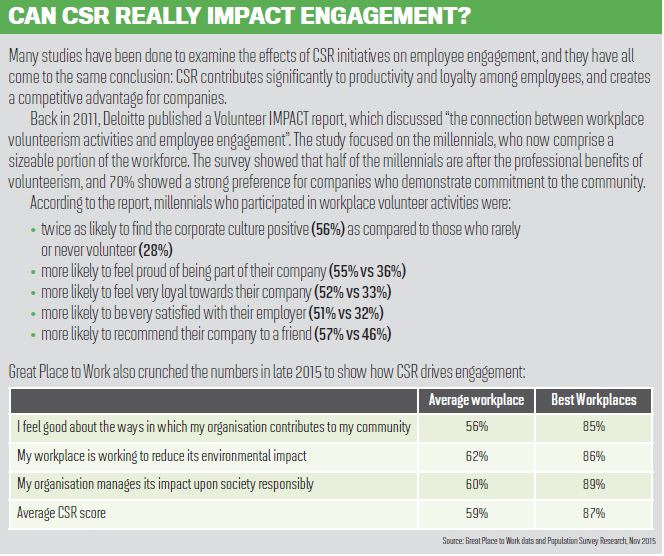Sam Neo outlines why CSR is more than just a ‘nice to have’ and how HR can unlock the true value of CSR initiatives
CORPORATE SOCIAL RESPONSIBILITY
(CSR) activities are often seen as a tool to enhance corporate image and make individuals feel good. But is that all CSR can deliver? Is it really a standalone portfolio? Can it actually complement your organisation’s people agenda?
Back in my earlier days when I was heavily involved in driving a charitable foundation and volunteer group, I came to realise that CSR activities actually have more potential than most people perceive. In fact, they should be a key pillar for HR and the organisation. Why so? Let’s explore further.
- Talent development platform
Activities don’t just happen. In most cases, companies will either assign teams to organise the volunteer activities on a rotational basis or have a group of passionate volunteers to get things going.
For the former, instead of randomly assigning, a more purpose-driven approach could be taken. Young leaders or highpotentials in companies can be tasked to spearhead such programs to test their ability to lead in a controlled environment. Besides that, they will have the opportunity to work with people outside of their comfort zone and develop skills that may not be readily honed in their current scope of work. Areas that talent can be exposed to may include project management, strategic planning and even external stakeholder management. This can be supplemented with the donation dollar to create a win-win situation for both the beneficiary and the organisation.
- Create shared experiences
Volunteering activities are a good tool that companies can employ to bring employees together and foster greater bonds. Whether it involves working with young children or the elderly, activities that require collective effort will help employees get closer and work together more cohesively outside a work context. Of course, activities should be planned in such a way that they don’t leave employees in silos or allow freeriding. Everyone must have a part to play so that with collective effort they can achieve a desired outcome together. An example might be building a herbal garden for elderly folk at a nursing home. After setting an outcome, employees can be asked to form teams and explore ways to best run the activity together. In turn, shared experiences are created and employees will develop a better understanding of one another while deepening their relationships.
- Opportunity for cross-entity interaction
For bigger organisations with multiple entities or companies with regional coverage, it is often difficult for employees across different units to meet up. Volunteer activities can provide the much-needed opportunity for employees from different areas to finally meet and interact. Employees will be able to finally put names to faces or simply make new friends during these activities. The additional platform for connecting with other groups of people within the organisation can help build invisible bridges that are necessary to enhance communication for cross-entity assignments.

Providing employees with time off from work to get away from their daily routine is a good way to boost mental wellness. During tough situations in the global market, we can expect the pressure faced by businesses to be passed on to employees. Individual workers will be expected to take on more work while facing a higher level of stress in delivering results. During such times, opportunities for them to take a breather will be crucial to prevent burnout and help enhance their productivity over the longer run. Taking their mind off work for even half a day will allow them to recharge momentarily while being engaged in meaningful work.
- Build a company with strong ‘heartware’
As important as the financial figures may be, companies that are truly successful are those that do not neglect the importance of their people. In order to ensure that the company advocates a culture with strong ‘heartware’, it is key for leaders across various levels to develop empathy. Empathy can be developed through CSR activities, whether by giving donations or doing volunteer work, once participants are able to appreciate the impact of their giving. Consistent exposure will help shape their beliefs over time, and that is essential to developing leaders with a people-centric mindset who can then drive a company with strong heartware. Not only will this impact existing staff, but it will help boost the company’s reputation as well as trust in stakeholders; an organisation’s success lies in its people.
It may seem that CSR activities are now viewed as tools for delivering a separate agenda instead of truly giving back to society. But instead of viewing them through a one-dimensional lens, why can’t there be multiple winners from such initiatives? After all, this does not need to be a zero-sum game in which either the community or companies have a larger share of the pie and must cannibalise one another. With the right moves and synergy, the pie can be expanded to benefit more groups. So next time someone tells you that CSR is a mere branding tool, remind them to think twice.
 Sam Neo is the assistant manager, HR business partnership and scholarship, at Changi Airport Group.
Sam Neo is the assistant manager, HR business partnership and scholarship, at Changi Airport Group.



 Sam Neo is the assistant manager, HR business partnership and scholarship, at Changi Airport Group.
Sam Neo is the assistant manager, HR business partnership and scholarship, at Changi Airport Group.